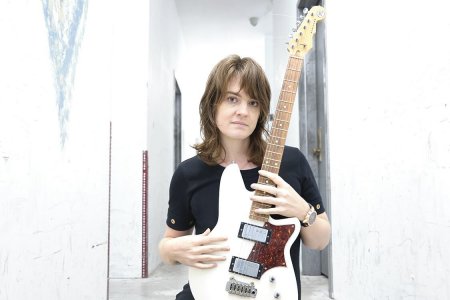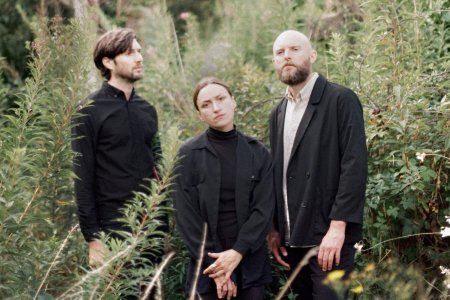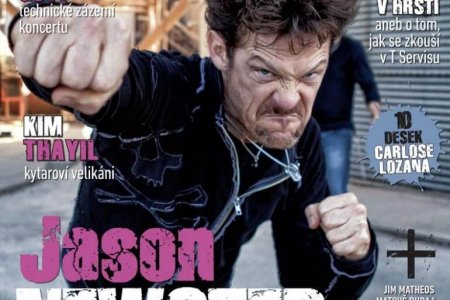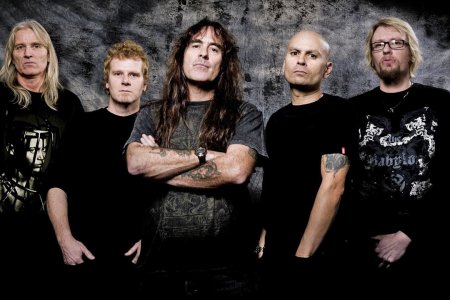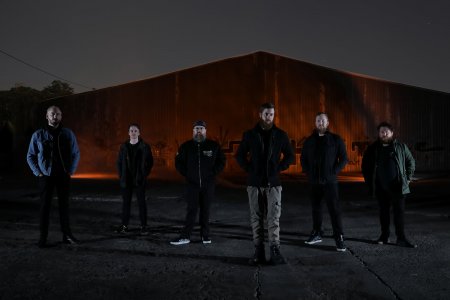British atmospheric rock trio Esben and the Witch currently living in Berlin, will be soon celebrating their tenth anniversary. Lately, they made some significant changes in their career and it would be so tempting to say, the latest album Older Terrors finally shows their true face. But from our email interview you may understand, there is still a long and unexpected journey ahead of them. New label, new home and darker stylistic direction are very crucial elements in their lives right now, but future is fully open.
Hello, thank you for finding time for this interview.
Thomas: Our pleasure, Dan.
I fell in love with your music with Wash the Sins Not Only the Face album. It actually reminded me a bit of an album, which my father always loved: The Sundays – Reading, Writing And Arithmetic. However, fortunately, you are taking much darker approach since then. What are the main reasons?
Thomas: I have never heard of that album, I’ll be sure to check it out. I like that kind of cyclical thing, where somebody will recommend us something we’ve never heard that our music reminds them of. Used to happen a lot with early 4AD stuff like Dead Can Dance and Cocteau Twins who I’d never heard of before we started out. We don’t set out to make ‘dark’ music per se, indeed I like to think it’s far more nuanced than that. We often find that the bleaker elements seem to resonate more and I wonder whether sometimes the sense of hope is lost somewhat. It isn’t often that we’ve set out to make something unrelentingly dark, it’s often meant more as a backdrop against which we can set more cathartic moments. To me it’s only as dark as it is light.
With all the respect, I feel you are reaching now more “niche”/smaller, but much more dedicated audience. I love the latest album Older Terrors the most! At the same time, I remember the days, when media was prophesying you guys a bright mainstream future. Were you since then trying to go away from the mainstream, as much as you can?
Thomas: Indeed, those prophecies were abandoned long ago! We never had any interest at all in becoming a mainstream proposition and were all somewhat mystified when we started being treated as such. Similarly we’ve never tried to actively avoid it. The thinking behind our band, what drives and inspires us, is similar now to when we started out. Nothing much has changed in that respect, although the tools we use to do it have changed drastically. We’ve gradually shed a lot of the electronic components since we started out, gradually become more a live band than a studio one I’d say.
I very much respect your artistic direction. Personally, I rather follow my heart, be proud of my work and meet people who understand me, rather than to sell out. However, do you sometimes get negative feedback, on your musical progression?
Thomas: Agreed. And part of that is understanding and being comfortable with the fact that not everyone is going to like everything you do. If, like us, you are interested in keeping a sense of progression alive from record to record and not settling on some particular formula then inevitably certain people will prefer certain albums. Clearly music is entirely subjective and that’s part of its beauty. Luckily we’ve reached a stage now, having released four albums, where we aren’t judged entirely on each new record. We’re lucky to have a loyal fanbase who understand that our aim is to achieve something more overarching and immersive, a world that doesn’t stop with one record.
This is your first release at Season of Mist, where it is very unique to see you next to numerous black metal bands. But deeper we look, there are Sólstafir or Thy Catafalque, who are much closer to you, I guess. Both amazing bands too…
Thomas: We became aware of Season of Mist when we toured with Solstafir in 2014. Those guys came to one of the shows and saw us play live. Then a few years later we had finished Older Terrors and were preparing to release it though our own Nostromo label when they approached us about doing it. They seemed passionate about our music, which is the most important thing to us when it comes to working with new people. The other thing was that over the last two or three years we’ve found ourselves playing at heavier, more metal orientated shows and festivals, working with Season of Mist seemed like a great opportunity to develop that and reach new people who might have no idea about us. So far it’s been a very good relationship.

World that doesn’t stop with one record
The darker feeling is so strong, yet pure and natural. I tend to call it “tasty melancholy”. What are your main inspirations? – Life experiences, nature…
Rachel: All of the above and many more. Nature certainly is cause for inspiration, I can’t really see how it couldn’t be. We’ve been lucky to travel quite extensively with our music and I will never forget some of the drives we’ve done. Through the Badlands of North America to the Swiss alps with their turquoise lakes. Nature, art, film, literature. All have been hugely influential in everything we’ve ever written. That’s not to say the songs aren’t also about personal experiences, far from it. I find song-writing, especially from a lyrical point of view to be a wonderful way to explore and express your own emotions, to paint a picture where you and hopefully the audience can immerse themselves for a few minutes.
As a post rock/metal and Interstellar movie fan, I am glad you working well with a gradation in your songs. However, why do you love working with gradation?
Thomas: We have always been interested in writing quite dynamic music and really we explored this to its logical conclusion on Older Terrors. Its always seemed to me that dynamics can heighten and intensify different sections. By that I mean, a more fragile, gentle passage can sound all the more beautiful and transient set against the backdrop of something louder and more frenzied, and vice versa. Each extreme enhancing the other. Dynamic music can also be quite demanding of the listener, by its very nature it only works in certain situations. I find that when it comes to listening to music like this myself, I’ll wait for particular moments when you can lose yourself in it, late night walks with headphones, long van drives, that kind of thing.
Wait for particular moments when you can lose yourself in it, late night walks with headphones, long van drives
I am also impressed with the length of your songs, where gradation has its space, but also it shows your musicianship development and a taste for songwriting. On the other hand, should we consider each song as a unique entity or part of one big piece?
Thomas: It’s important to us that the songs collected together on an album are assembled for a reason, that there are common threads running between them. We spend a lot of time arranging the track too so that album moves in the way that we want it to. Well, there was less of this than usual with Older Terrors… there is only so much maneuvering that can be done with four tracks after all! Whilst thematically the four tracks on Older Terrors all have certain things in common the idea was that each could be separated from the rest and make a statement on its own as well. It’s one of the things I like most about long tracks, they can unfurl gradually and have a sense of journey to them. They can start in one place and end somewhere different and contain true contrasts within them.
Give us please an idea, how did the songwriting look like this time?
Thomas: The songs started life in the basement of a strange house in this kind of weird, Ballardian, compound in the south of Berlin. We all lived together there for some months when we first arrived in the city, we were very much the odd neighbours I think. Rachel started the process this time, writing bass lines. It was hot and when she had the windows open you could just hear these distorted chugging riffs emanating from the basement when you were out in the garden. I then joined her and we started adding guitar and developing things a bit. Musically mainly but also starting to think about the imagery we wanted to evoke and the lyrical themes as well. It wasn’t until we sorted a proper rehearsal space (much to our neighbours joy, I’m sure) that Daniel started to get involved with the drums. Seems quite a backwards way of doing things in some respects, adding the percussion last, but it worked for us. We then would just kind of jam the heavier parts out and work out how parts would then flow into each other.
What are your feelings when you look at work of Caspar David Friedrich?
Rachel: I find myself quite relaxed, soothed by Friedrich’s work. Be it the golden sunsets setting over a sea, or the gothic snowy forests with ancient ruins looming. I find a sense of awe, humbling awe within them, especially as he often includes a human figure in his paintings, pensively viewing the landscape they find themselves in. They have a sense of calm, a moment to stop and watch the sun glowing or the tussle of tumultuous waves. A moment where you realise the world is way bigger than you.
I find it melancholic, which I don’t necessarily take as a negative emotion at all. But, I believe it’s very unique to combine melancholy of a foggy forest and a raging fire. What approach did you have to take, as an artist, to combine these two emotions?
Rachel: Following on from my last answer, I agree with you totally. I don’t equate these things with a negativity, far from it. I find these things beautiful. The enigma of the natural world and it’s wild power I will always find both alluring and something to seek solace in. Even more so in recent times when it’s easy to despair about the planet and the things we do to it and to each other. With the contrast you mentioned between a forest in fog and a raging fire, I think as a band we’ve always been interested in dynamics both musically and emotionally (as Thomas mentioned a few questions ago) so it comes quite naturally to us to try and include both these feelings, these moods within a song. To try and write a piece of music that has layers and depth and hopefully has the potential to move the listener between different extremes.
You mentioned about a song Sylvan: “It is about searching for meaning and even beauty in a burning world.” Do you believe, when we start losing our world, we actually start to realize what we actually have? We can relate it to ecology and relationships as well…
Rachel: Yes, I absolutely do. Without wanting to sound too nihilistic, I think we are as humans are inherently selfish, short-term thinkers. On the other hand, I also fully believe in our potential to love deeply and to do brilliant things and to find beauty and hope in even the most difficult of situations. I find that element incredibly inspiring. There is a lyric by ‘A Silver Mt.Zion’ that I think describes this perfectly. “Hang on to any fucking thing you love” What else can we really do?
Another song, which I would like to mention is my personal favorite: The Reverist, with breathtaking sound of a guitar, in the middle. What is your secret for an unique sound of the new album within effects and production?
Thomas: We wanted the new album to draw some loops, layers and atmospheres back into the fold. A New Nature was intentionally a very sparse, stark record. We wanted to expose what lay beneath all the reverb and affectations. We wanted it to be ‘heavy’ not necessarily in a volume sense, more carry an emotional intensity. For Older Terrors we wanted to retain that live feeling, we tracked the songs in the same way, playing together in the same room, but added synths and acoustic guitar overdubs with the aim of creating something lusher. Production wise it was similar, these elements are intended to be like atmospheric beds from which the songs unfold, when things get loud they aren’t supposed to intrude and then, as things retreat, they re-emerge. We didn’t want to spend much time in the studio working on parts that can’t be recreated live at all.
Berlin and future
How was moving to Berlin? I can imagine it was challenging, yet adventure.
Rachel: It has certainly been both of those things. Personally speaking, I found it a lot more challenging than I expected it to be, but I guess the best things are, right? I definitely felt ready to leave Brighton, and England for a while, I’ll always remember driving a rental van from my flat in Brighton to my parent’s house, ready to drive across Europe to Berlin the next day. All my earthly belongings jammed in the back of a van, leaving a wonderful city I called home for a decade. It was a glorious day, blue skies and sunshine, the perfect adieu to a seaside town. I was driving listening to music, one of my favourite things to do and I didn’t feel sad, I felt excited yet totally calm. It was the time for another adventure in another city, in another country.
Hang on to any fucking thing you love! What else can we really do?
Did the emotions of moving to Berlin end up on the album?
Rachel: I think they have yes. Whilst the album is not explicitly about Berlin or the moving process, I think it’s impossible for the emotions to not be imbued within the record. Not only the emotional turbulence involved but also the more mundane aspects of life, logistical boundaries of where to write, where to practise, money, work etc informed the WAY we wrote and recorded. Emotionally speaking, I think the three of us all have different feelings about this and what we put into the record, we always tend to. All our records have a degree of escapism in I think and this was a record which I could escape into, wrestling with some demons at the same time, as cliched as that sounds. It was a slightly difficult but cathartic process.
How do you look at Berlin scene, which has huge respect, not only since David Bowie… It has melancholic effect on me, because every time I go there, it is raining. Last time, few months on The Black Queen show…
Rachel: Berlin can certainly be pretty brutal, especially in the Post-Christmas months, I’m happy to finally see some sun shining through the grey. The scene here is definitely refreshing for me. There’s obviously a big techno and dance scene here which, whilst not what I tend to listen to, I have friends who are making really cool music in that world and the community I’ve stumbled on is super creative and super welcoming. I can say the same for the Black Metal scene that we’ve also encountered in Berlin and other cities throughout Germany. We’ve played shows with some great BM bands like Sun Worship and Ultha who we now consider friends. All making different kinds of music but all intense and passionate in their own way. That’s always a good thing for me.
I found moving to Berlin a lot more challenging than I expected it to be, but I guess the best things are, right?
Where would like to take your music further?
Thomas: Well there is always a period of calm in the aftermath of a record. It lasts a different amount of time for each of the three of us and it’s kind of a period for us to disentangle ourselves from the past month. It gets pretty all-consuming for us so we need a bit of time to take stock. Gradually during this time ideas start to form in the shadows. For me, the last record goes from being my whole focus and becomes more of a signpost, pointing me onwards. I’d like to explore writing simpler, faster songs. Next to it, I’d like to mix in more acoustic guitar a start singing. These are all ideas that are forming. How they’ll each pan out and mix together remains to be seen. Its early days of course but I certainly feel inspiration beginning to stir and the cogs grinding into gear once again.
Thank you and hope to see you in Czech Republic soon…
Thomas: Yes, thank you. We’d love to return, hopefully we have something coming soon.

